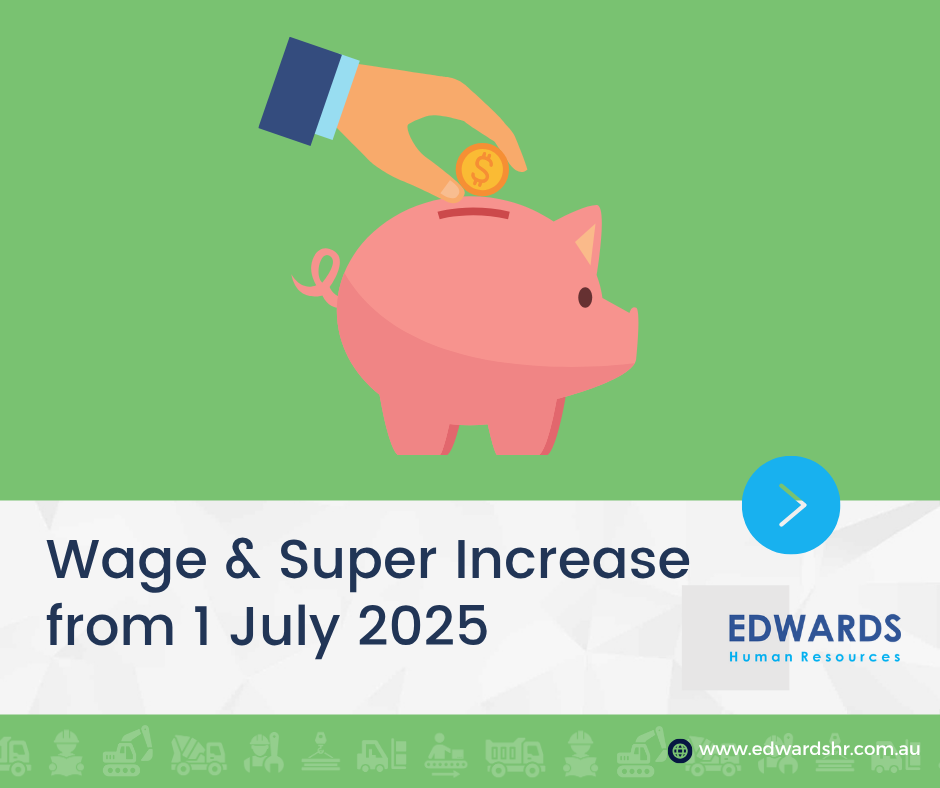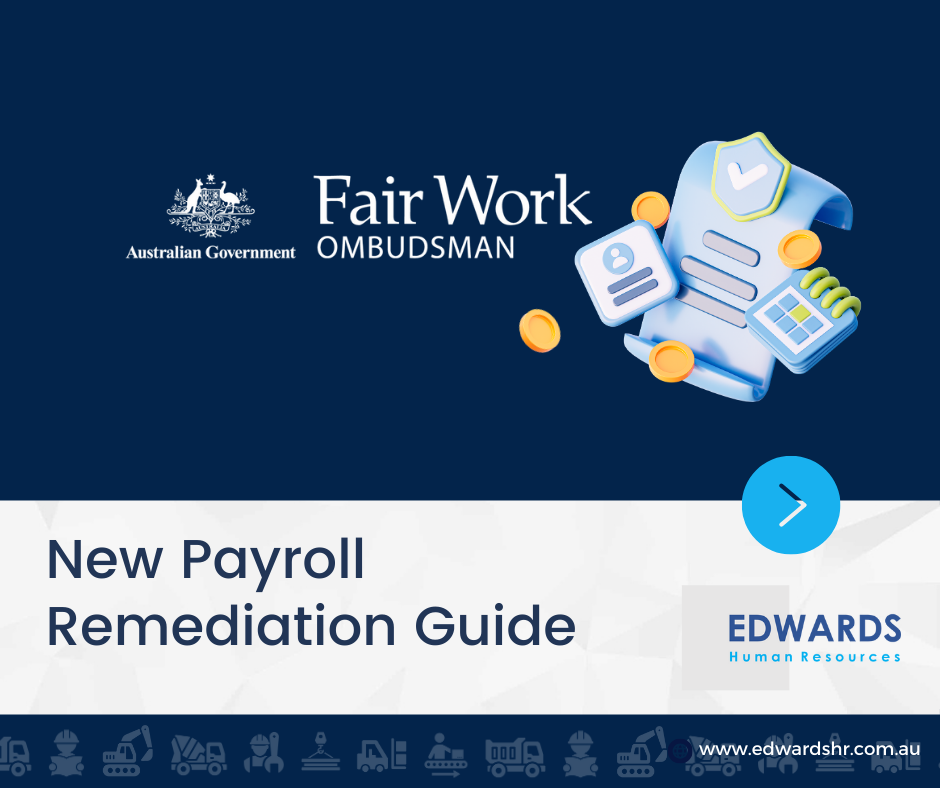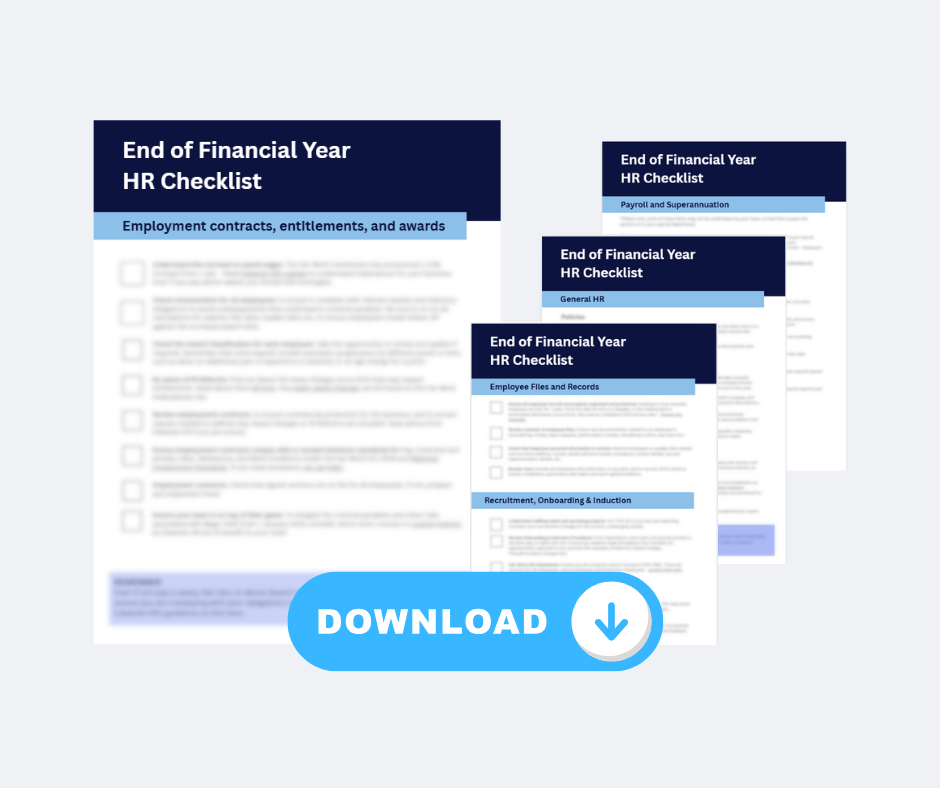- Published
The Fair Work Commission has confirmed a 3.5% increase to minimum Award wages and the National Minimum Wage as part of the 2025–2026 Annual Wage Review. These changes will apply from the first pay period commencing on or after 1 July 2025.
The decision will also see National Minimum Wage increase to $24.95 per hour or $948.00 per week.
The Superannuation Guarantee (compulsory employer contributions) also increase to 12% from 1 July 2025.
We encourage all employers to read this update as there will be significant impacts for businesses.
Wage Increases
Minimum rates in all Modern Awards will increase by 3.5% from the first pay period commencing on or after 1 July 2025.
The National Minimum Wage will increase by 3.5%, applying to employees who aren’t covered by an Award or agreement.
This change affects a wide range of employees across most industries. It also means associated penalty rates and allowances may increase depending on the Award.
Updated pay guides will be published by the Fair Work Commission in the coming weeks.
Gender Undervaluation Analysis
In addition to the standard increase, the Fair Work Commission announced targeted wage increases in female-dominated industries to address gender-based undervaluation on the 16 April 2025.
These adjustments apply to certain classifications in Awards covering care and support roles, among others. If your business operates in one of these sectors, it’s important to review the changes closely to determine whether additional wage increases will apply to your workforce. Find out more.
The FWC also confirmed that their next priority is to review all professional classifications across modern awards. More to come on this as updates are available, so be sure to subscribe to updates on our website.
Superannuation Increase
Also from 1 July 2025, super guarantee (compulsory employer contributions) will increase from 11.5% to 12%.
Super has been increasing by 0.5% each financial year since 2021, and this will be the final scheduled increase to reach the legislated 12%.
At this stage, there are no further increases planned beyond 12%, but it’s always worth keeping an eye out for any future changes.
You can find more information on the ATO website.
It is prudent for all employers to ensure their payroll system applies this change from 1 July 2025, noting that it may fall part-way through a pay cycle.
New Criminal Offence: Wage Theft
From 1 January 2025, intentional underpayment of wages or entitlements is a criminal offence under new federal law.
This means businesses and individuals can face criminal charges (fines and potential imprisonment) if they are found to be intentionally underpaying employees. There is also an expectation of a ‘positive compliance culture’ meaning that payroll compliance must be a continual focus for all employers, no matter their size or industry.
The new laws are part of a broader move to crack down on wage non-compliance. While unintentional mistakes aren’t criminal, they can still result in significant penalties, backpay orders, and reputational damage.
Employers should review their payroll practices and ensure any individual involved with payroll is appropriately trained to ensure compliance and avoid severe penalties. Check out the tailored training and short courses offered.
Our quick tips for ensuring compliance
- Do not assume this doesn’t apply to you – take it as your opportunity to review your remuneration practices for compliance. Rememer that the national wage theft legislation is now in effect, so now is the time to review and improve your practices. You can read our Quick Guide to Wage Theft & Underpayments here.
- If your employees are covered by national minimum wage or an Award, familiarise yourself with the new rates before the 1 July 2025 effective date, then ensure any necessary changes are passed on by the first full pay period starting on or after 1 July 2025.
- Take the opportunity to check that each employee is correctly classified under the Award level applicable for the work they perform and is receiving any applicable allowances or other relevant entitlements.
- Any changes to employment details, pay rates or entitlements should be confirmed in writing for each employee, and adjusted in your payroll system. If you intend to issue new employment contracts, seek advice about doing so to ensure you have clauses that cover the upcoming changes to casual employment and the right to disconnect.
- Check that your payroll system is setup to pay superannuation correctly from 1 July 2025.
- Read more about paying above-award, allowances, flat rates and salaries in the FAQ’s below.
- This should not be a set and forget exercise. Speak with Edwards HR about undertaking a wage assessment periodically or conduct training to ensure you are meeting your employer compliance obligations.
- Ensure any person involved with preparing contracts, advising on entitlements and/or processing payroll is appropriately trained and up to speed with legislative changes. Check out how Edwards HR can help here.
FREUQENTLY ASKED QUESTIONS
We have provided the answers to some frequently asked questions below and will provide another update for employers when Modern Awards and their corresponding Pay Guides have been updated in the coming weeks.
The FWC’s decision announcement can be found here.
An updated version of the Fair Work Information Statement will also be available from 1 July 2025.
Wage compliance is a significant area of focus for the Fair Work Ombudsman so it’s important you get it right. There are heavy penalties and costly backpay obligations that may result if employers do not act on these changes. On the 1 January 2025, wage theft became a criminal offence, with increased penalties including jail time.
If you currently pay above the award minimum rate, we recommend checking the new (increased) pay rates and ensuring the current pay rate for each employee is still at or above the new minimum.
You are not required to increase pay rates if they remain the same as or better than the new minimum rates (however, you can if you wish to).
Some allowances will also be impacted by the increase. Where an allowance is expressed as a percentage of the ‘standard’ rate (which is linked to the wage of a particular classification in the Award) or considered an ‘all-purpose allowance’, these allowances will generally increase in line with the ‘standard rate’.
You should check the allowances applicable to your team once the Fair Work Commission has updated the Awards and pay guides, and also check that any applicable superannuation is calculating correctly.
Employers should undertake a review of their enterprise agreement (EA) rates to ensure the increased Award rates don’t ‘leapfrog’ the enterprise agreement rates. Where they fall behind, EA rates should be increased to (at least) match the new Award minimum rates.
Employers who have committed to annual wage increases in their Enterprise Agreements should also review these provisions and take action accordingly.
If you pay any employees a flat rate, loaded rate or have an Individual Flexibility Arrangement in place to cover another arrangement, you are required to ensure the employee/s remain better off overall when compared to the new minimum rates and allowances. We recommend undertaking an assessment of each arrangement to ensure compliance.
Employees paid annual salaries may be impacted in different ways depending, for example, on whether they are:
- Covered by an Award or EA;
- Award free; or
- Covered by an Award containing ‘annualised wage’ provisions.
We recommend reviewing the above, along with individual employee circumstances to ensure compliance.
Need Support?
This is a yet another change for employers this year, and wage compliance remains a significant area of focus for the Fair Work Ombudsman so it’s important you get it right. Unfortunately, it’s also tedious and time consuming so let us help you!
Contact the Edwards HR team to understand how this decision may impact your business or to discuss how we can look after your wage assessment compliance needs.
As always, the team at Edwards HR are here to answer your questions and provide support across all areas of HR.
Get in touch with our team today to discuss how we can help.
Stay up to date with all the upcoming changes via our Linkedin or sign up to our ‘Employer Update’ newsletter.



